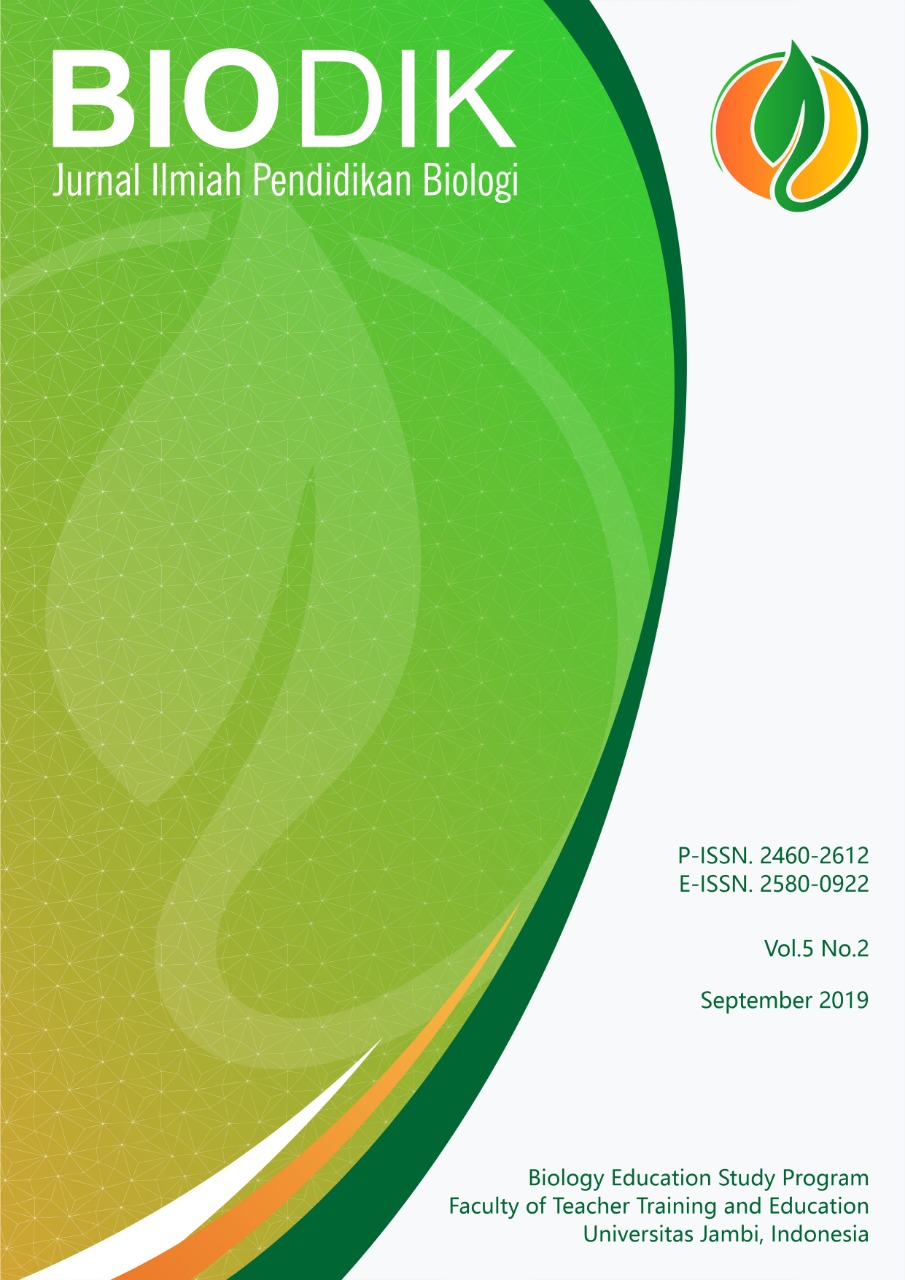Pengaruh Strategi Pembelajaran PQ4R (Preview, Question, Read, Reflect, Recite, Review) Terhadap Hasil Belajar Ilmu Pengetahuan Alam Terpadu Siswa Madrasah Tsanawiyah
The Influence of PQ4R Learning Strategies (Preview, Question, Read, Reflect, Recite, Review) on Integrated Natural Sciences Learning Outcomes Madrasah Tsanawiyah students
DOI:
https://doi.org/10.22437/bio.v5i2.7076Abstract
The purpose of this study was to determine the effect of the PQ4R Learning strategy (Preview, Question, Read, Reflect, Recite, Review) on the learning outcomes of Integrated Science in Islamic Education in Biology learning. This research is a quasi-experimental study using the Posttest-Only Control Design design while data collection is done using a test instrument. The sample of the study was class VIII C (experimental class) totaling 28 students and class VIII D (control class) totaling 28 students. The research data obtained the highest score in the experimental class was 92 and the lowest score was 44 with an average of 72, while in the control class the highest score was 80 and the lowest score was 40 with an average of 63.57. Based on the calculation using the t test obtained thitung = 2.77 and at a significant level of 5% obtained ttable = 2.01 and a significance level of 1% t table = 2.68 thus 2.01 <2.77> 2.68. So that Ha is accepted, meaning that there is a significant influence on the results of Integrated Science learning of students who use the PQ4R learning strategy (Preview, Question, Read, Reflect, Recite, Review) in the Madrasah Tsanawiyah.
Keyword: Student learning outcomes, PQ4R learning strategy (Preview, Question, Read, Reflect, Recite,Review)
Abstrak. Tujuan Penelitian ini adaah untuk mengetahui pengaruh strategi Pembelajaran PQ4R (Preview, Question, Read, Reflect, Recite, Review) terhadap hasil belajar IPA Terpadu di Madrasah Tsanawiyah pada pembelajaran Biologi. Penelitian ini merupakan penelitian quasi eksperimen dengan menggunakan desain Posttest-Only Control Design sedangkan pengumpulan data dilakukan dengan menggunakan instrumen tes. Sampel penelitian adalah siswa kelas VIII C (kelas eksperimen) berjumlah 28 orang siswa dan siswa kelas VIII D (kelas kontrol) berjumlah 28 orang siswa. Data hasil penelitian di peroleh skor tertinggi di kelas eksperimen adalah 92 dan skor terendah 44 dengan rata-rata 72, sedangkan pada kelas kontrol diperoleh skor tertinggi 80 dan skor terendah 40 dengan rata-rata 63,57. Berdasarkan perhitungan menggunakan uji t diperoleh thitung= 2,77 dan pada taraf signifikan 5% diperoleh ttabel = 2,01 dan taraf signifikansi 1% ttabel= 2,68 dengan demikian Sehingga Ha diterima, artinya bahwa terdapat pengaruh yang signifikan terhadap hasil belajar IPA Terpadu siswa yang menggunakan strategi pembelajaran PQ4R (Preview, Question, Read, Reflect, Recite, Review) di Madrasah Tsanawiyah.
Kata kunci: Hasil belajar siswa, startegi pembelajaran PQ4R (Preview, Question, Read, Reflect, Recite, Review)
Downloads
Downloads
Published
Versions
- 2019-09-03 (1)
- 2019-09-03 (1)
How to Cite
Issue
Section
License
Copyright Notice
Authors who publish with Biodik : Jurnal Ilmiah Pendidikan Biologi agree to the following terms:
- For all articles published in Biodik : Jurnal Ilmiah Pendidikan Biologi, copyright is retained by the authors and grant the journal right of first publication with the work simultaneously licensed under a Creative Commons Attribution-ShareAlike 4.0 International Licensethat allows others to share the work with an acknowledgment of the work's authorship and initial publication in this journal.
- Authors are able to enter into separate, additional contractual arrangements for the non-exclusive distribution of the journal's published version of the work (e.g., post it to an institutional repository or publish it in a book), with an acknowledgment of its initial publication in this journal.
- Authors are permitted and encouraged to post their work online (e.g., in institutional repositories or on their website) prior to and during the submission process, as it can lead to productive exchanges, as well as earlier and greater citation of published work (See The Effect of Open Access).

















